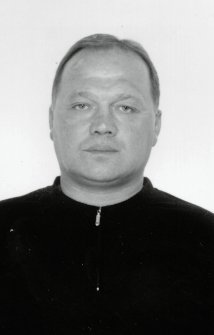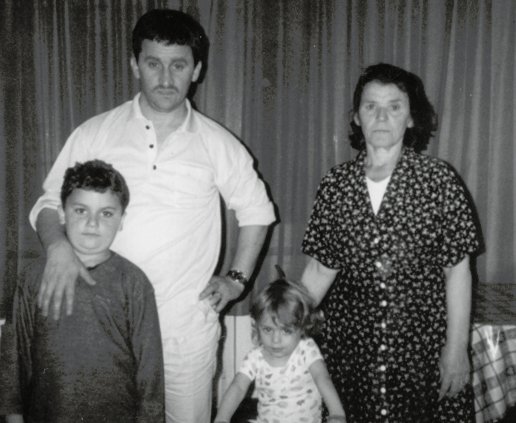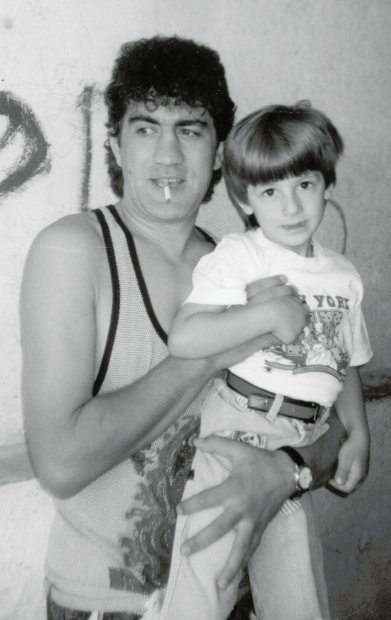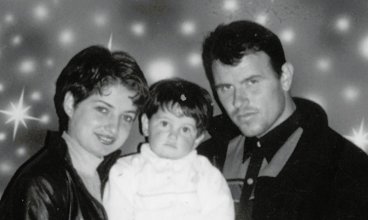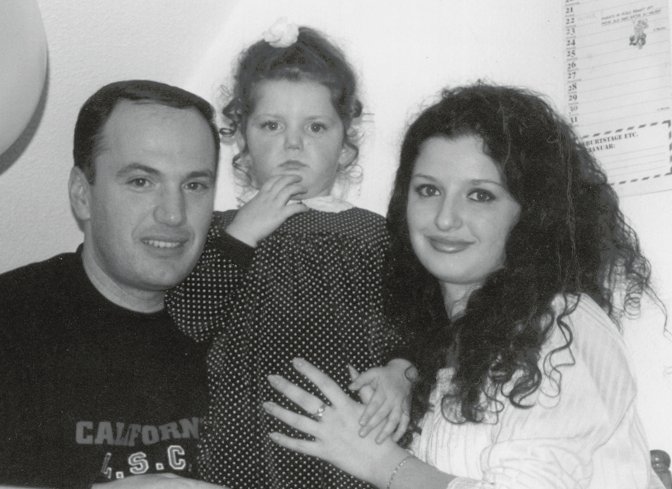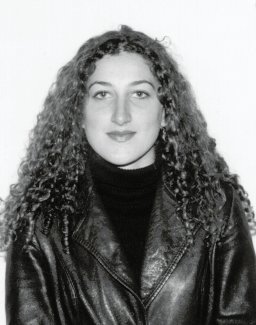
nr.49 / 16 shtatot 2003
|
Who protects the criminals?
Sokol Pepushaj
Laē of Milot: The policeman of the
special forces, forced to leave Albania His
name is Valentin Mura and was born on May 26, 1969, in Sanxhak, a village
near Laē. He studied firstly at After the TV-s broadcasted what happened
on the days 22 and 23, he left with his family and went abroad, in order to
save his family. His return in Albania means death for him and his family. Zef Nika
Well find Gjovalin Zefaj, even if he
hides underground
On October 2000, during the local
elections, Gjovalin Zefaj was in the elections errand. He was born on July
17, 1968 and lived in Naraē. He was by the right wing interests as he was
persecuted by the communists for the simple reason that he loved the
individual freedom in the United States. He didnt allow the policemen to
take forcedly the votes boxes, to be sent at the police department, where
could be counted in favor of the communists. Gjovalin Zefaj takes the boxes
from the hands of the policemen, to send them at the center of the district,
but the policemen were ordered to shoot on Gjovalin Zefaj, who was wounded.
After October 20, 2000, Gjovalin Zefaj has no address. Even his family, his
friends and the party he was a member of, know nothing about him. The police
department knows exactly he is somewhere abroad, as they want him at all
costs. His only wrong is he didnt permit forced manipulation of votes. This
fact was also reported by the OSCE Office of the District, in a report on
elections. Well find Gjovalin Zefaj, even if he
hides underground, were the words of the chief of the police. This was
reported to the family of Gjovalin Zefaj by the police Pashuk Hila, and this
is the reason he is fired. The person, for whom the votes were
being gathered by the police, lives at the same village of Gjovalin Zefaj. He
is considered to be in enmity with Gjovalin and is waiting to avenge as he
didnt let him steal the votes. Gjovalin Zefaj, is thus in the midst of two
fires. The police wants him and his enemy wants him as well, though he has no
guilt. Dashamir Cacaj The Albanians life in danger The
fear and unsafe life makes even the dependents of the state, who serve it, to
leave their work, the family and the country. One of them is Mr. Gjergj N.
Guri from Qerret of the municipality of Temal in Shkodra, former Zef Nika
Will blood feud ever end in Albania? It
is very hard to leave in a country where the state is inexistent; where the
crime is every day taking away innocent lives; where hundreds of children
have left school and hundreds of families live shut in; where This is my report, as a mother, for the
newspaper. My name is Armanda Kadija. Though young, Im suffering, along with
my 6-years old daughter, the consequences of the missing state in Albania.
Since December 25, 2000, my husband, Gilman Kadija, is suffering living shut
in because of a conflict for property motives. His cousin, Fahri Kadija, has
wounded during a quarrel, the citizen Zamir Ramiz Rama. The family Rama tried
to avenge not only on my husband, but even on us as women. On March 13, 2001, two masked people
with guns, stopped me and tried to put me forcedly in a car. I am sure those
people were from the family we are in conflict with. Thanks God and the help
of a couple I escaped from their hands. I didnt report this to the police as
I feared revenge would increase against us. My husband, Gilman Kadija, was
not the author of the crime. He is being condemned by the family Rama, just
because he was very near by the incident and because he is the cousin of the person
who wounded Zamir Rama. I appeal to the Albanian state and its
order and justice departments, to give shelter to my family. We asked for
help even to the Missionaries of Peace of Albania since August 2002. I also
ask you, as an independent journal, to help us making known our problems to
the opinion. Armanda Kadija
The troubles of Pjetėr Lleshi The
48-years old Pjetėr Frrok Lleshi, since 1997 has chosen to leave Albania, as
his only way to save his life. Zog Hysenaj
Who is managing crime? This
is a question that we, as journalists, are continuously considering, despite
the pressures and death threats we often receive. The questions accusing the
structures of the state are really dangerous, as Albania is the country where
the crime is steady and the law is only on the letter, where the medieval
Canon is very powerful and the same structures of this state give ground to
the crime. Our investigations report that on April 22, 2002, on the road of
Balldren in Lezha, masked persons with guns have shot on Vasil and Tonin
Shkėmbi, while theyre going back home with their vehicle. God and the good
luck helped them to come out unwounded, while the vehicle was damaged. The
family Shkėmbi reported this to the police, but evidently there wasnt much
interest on finding out and arresting the authors by the police. In most of
cases the police dont arrest the criminals. It seems like the police is only
able to catch the victims. On reliable sources we have, Vasil and Tonin
Shkėmbi have been shot for revenge by another family, for the family Shkėmbi
had committed a murder years ago. The reliable sources we have, say that the
family Shkėmbi was in enmity since years ago. Today, even the explosion at
the house of the candidate for mayor of Shkodra, Mustafė Lici, is being
overseen, just like the case of Vasil and Tonin Shkėmbi. The criminals are
not being cought. The problem, yet is somewhat deeper, as we have the right
to ask who is managing the crime? As the state is not finding the way to
establish the authority of the law, the responsibility is obviously on it. Denisa Kraja
The plagues of revenge It
is terrible when you think that today in the 21st century the
Albanians in general and the North Albania in particular is still hostage to
one of the most bleeding plagues, causing a lot of clean Albanian blood to be
shed by the Albanians. The law supporting this plague is over five
centuries old and has the name of Canon. The foreign peoples do not even know
this name, as they have their state of law that puts on order every social
problem. We too have a state, which has only the name of it, for instead of
helping the healing of this wound, it only messes everything up
There are
many cases of families, hostages of primitive revenge. Our journal wants this
time to tell about one of the innocent Albanian families undergoing the
revenge according to the Canon, blood feud. This is the family of Mark Fran
Marku. This all happens because the laws in Albania are unable to face the
law of revenge. Behold how an unwanted incident can be turned on a Calvary
of revenge. Murders, wounding, murder attempts are almost common in the daily
life of the Northeastern area of Albania. As we mentioned above, this same
bad luck was on Mark Fran Marku form Ivanaj of Bajza in Malėsi e Madhe. This
family is now a victim of blind revenge as a result of an unwanted incident
that Fran Marku, the father of Mark in Ivanaj of Bajza, stroke with his car,
causing the death of the child Arben Gjoka Kastrati. This happened on August
28, 2001. By this painful and innocent incident of the family Marku, the life
of this family was being destroyed, as the family of Gjoka Kastrati (the
family of the dead child), according to the laws of the Canon for the blood
feud, decided to avenge. This revenge wants victims from the family Marku,
trying to kill any of them. During this period the family of Gjoka Kastrati
has shot several times on the house of the family Marku, were they supposed
they were living shut in. It is worth to mention two cases when the family
Gjoka Kastrati has shot numerous bullets against this house. When the avenger
noticed that the family Marku had abandoned their house, they destroyed it
totally. We, as journalists, have many times
tried to meet the two families, but the family of Gjoka Kastrati does not
want to, as they say they have to take revenge for the young child, while
from the family Marku there is none in Albania. Mark Fran Marku has left
Albania, along with his family, since December 25, 2001, because of blood
feud. Since that day, there is no evidence of this poor family, either
theyre alive somewhere hidden around the world. It is clear, that the state
knows this horrible thing of revenge and keeps silent, or even smiles,
leaving free way to the barbaric law of blood feud. It is so painful that
Mark Fran Marku, fifty years old (born on January 31, 1953), instead of
living his life in his country, with his family, has to depart, just to save
his life in serious danger from the unmerciful avenger
Ndue Bacaj
Serious situation in Kosovo It
is historically known that the situation between the ethnics, especially that
between Albanians and Serbs in Kosovo is really serious. These two peoples
consider each other enemies. Such a situation is unfortunately still today,
getting even harder, mostly after the war in Kosovo, what is not the need to
write of. Many events are known, but what impress the most are the heavy
consequences it left back, even today, with enmity even amongst Albanians.
The situation of security, despite the presence of the international forces,
is still hopeless. Peja is one of those places where Kosovars and Serbs live
together. This is even the destiny of Zora Kurtulaj, or Serb origin, from
Peja, married to an Albanian from Peja. During the last war, the Albanians
and the KLA in particular had doubts on Zora as a collaborator of the Serb
police and army. The KLA found an appropriate moment to take revenge on Zora,
beating and using violence on her, also looting her house. This was not only
on Zora but also on her daughter Edmonda Smajlaj, as she was at home in that
moment. She was taken away and kept as a hostage for some time. In these hard
conditions of life in Peja, Zora leaves Kosovo and goes in Montenegro. In the
beginning of 2003, she goes back to Kosovo, to leave where she used to, but
it was in vane, as she found herself again threatened, again by the forces of
KLA, forcing her to leave Kosovo again and go back to Montenegro. This is the
bad luck of this mother and her daughter, forced to leave Kosovo. This is
just to save their lives, as every other attempt to turn back to Kosovo is
impossible for KLA is looking not only for Zora, but many others, to avenge,
no matter if they are Albanian or Serbs. The revenge goes on. Vasel Gilaj
Why did the major of the Secret
Service leave? His
name is Gėzim Ndrecaj, born on March 26, 1960. He graduated at the Faculty of
the IAM (Internal Affairs Ministry) (the branch of Security) in 1983. That
same year he was named officer in the District of Dibra and his carrier went
on until he became vice chief of the Secret Services for Dibra in the rank of
major. On July 9, 1992 he was fired by the point 24/1 of the law. He was back
on his work after the Socialist Party won on December 1997, again in the Secret
Services, in the sector of clandestine. He worked firstly in the area of
Montenegro, in coverage of an ambulant merchant. On December 1998, until June 1999, the
chiefs of SIS have introduced him to the chief of CIA in Albania, Vilma and
the vice, Daniel, for whom he did many important services. For over three
months, during 1999, he worked for the American secret service. SIS and CIA
have estimate his work and have once rewarded him with 100 000 Leks. During
1999-2000, Gėzim obtained important evidence on espionage and
counterespionage, giving report of many people who were implied in Greek and
Serb-Greek secret services, mostly politicians and even people of Albanian
diplomacy working for those services. All that evidence can be found in a
special folder encoded SH-XX0, in the archives of SIS. The two anonymous
numbers are lower than ten and the third is zero. In 2002, Gėzim had
threatening anonymous phone calls, addressed to him and his family. This
occurred mostly after the firing of the former chief of the SIS, Fatos Klosi,
when the secret documents were misused by inner dependents of SIS. On July
2002, Gėzim was called by principals of SIS, to declare as if he was two
times rewarded by this institution in very large amounts of money. Besides
this, Gėzim was also threatened by people implied in Serb-Greek services, who
could read the secret documents of SIS. One of the most important evidences
Gėzim gave to SIS, was the meeting in Greece of the principal of the Greek,
Serb and Montenegros secret service, with some politicians, to find out the
way to disestablish the country and grow their influences in Albania in 1997.
This is why the major of the security (SIS), Gėzim Ndrecaj, couldnt stay
anymore in Albania. His only safe way was to emigrate. This is also the
motive he cannot come back in his birthplace, because he knew and spoke more
than he had to. Rifat Ymeri
A heavy burden for Klelia Hysaj
Zojė Berisha |



